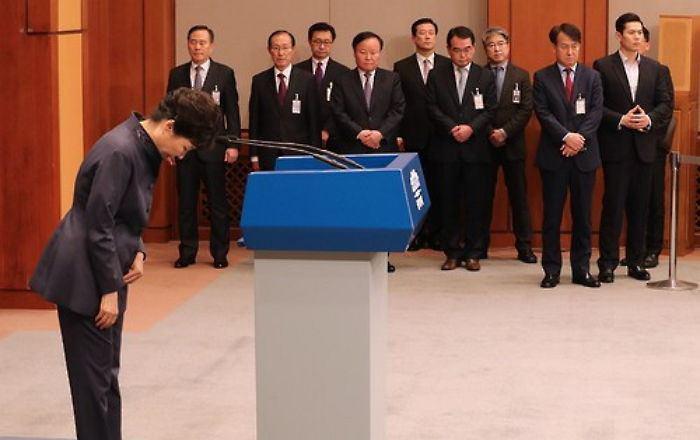SEOUL, Dec. 21 — South Korea's ruling Saenuri Party is expected to be cut in half in the near future as scores of lawmakers with one of the two party factions agreed on Wednesday to defect next week after the presidential impeachment.
A group of 35 legislators of the so-called anti-Park faction, who are not loyal to impeached President Park Geun-hye, reached an agreement to leave the party on Dec. 27 during a televised emergency meeting.
Intra-party strife stiffened between anti-Park and pro-Park factions after the bill to impeach President Park was passed on Dec. 9 through the National Assembly with an overwhelming support.
Almost half of 128 Saenuri lawmakers voted for the impeachment motion, indicating additional Saenuri lawmakers could join the defection move in the foreseeable future.
The division in the ruling bloc blurs the prospects for next presidential election as it raises possibility for turning the election into a four-way race.
The minor opposition People's Party, which is composed mostly of former members of the biggest opposition Minjoo Party, was launched in February and gained 38 parliamentary seats in the April general elections.
A new party that will be created by the anti-Park faction may surpass the number of People's Party-held seats in the unicameral assembly. The Minjoo Party has 121 lawmakers, while there are six legislators with the minor opposition Justice Party and seven independent lawmakers.
The opposition bloc has already been divided, while the anti-Park faction's group defection from the Saenuri Party will split the ruling bloc.
Attention is expected to be paid to whether the People's Party and the anti-Park faction's party would form a so-called "third playing field," where non-mainstreamers in both ruling and opposition parties compete to field a single candidate in next presidential election.
South Korea seems to have entered an initial phase of presidential race after the presidential impeachment.
If the constitutional court permanently removes Park from office after deliberation for up to 180 days, an election to select the country's new leader must be held in 60 days.
